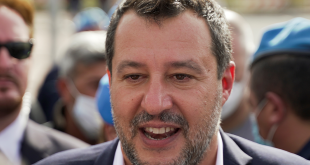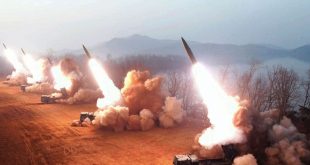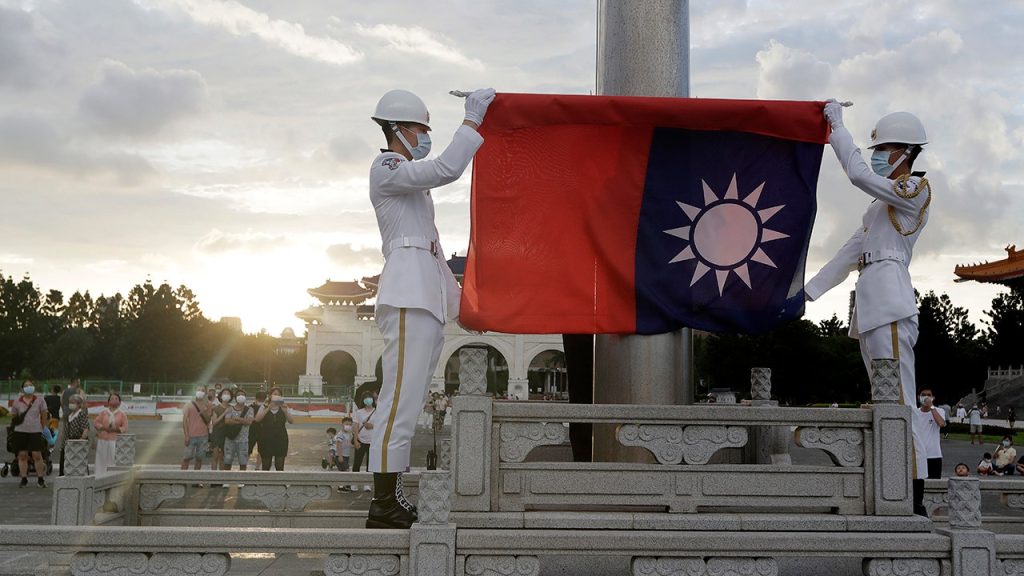
On Wednesday, the Chinese Foreign Office sharply criticized the United States after a senior Defense Department official visited Taiwan.
China’s Taiwan Affairs Office spokesperson Zhu Fenglian accused the U.S. and Taiwan’s ruling Democratic Progressive Party of attempting to push the island’s independence from China and discouraged the alleged efforts.
China “resolutely opposes any official interaction and military collaboration” between the two countries, Zhu said Wednesday, further underscoring tensions between Beijing and Washington, D.C. over Taiwan.
The comment comes after Michael Chase, the Deputy Assistant Secretary of Defense for China, visited Taiwan amid Chinese military movements in the Pacific Ocean and the East China Sea.
CHINA FURIOUS AFTER US WARNS AGAINST ARMING RUSSIA: ‘THE US IS IN NO POSITION TO TELL CHINA WHAT TO DO’
Zhu also reaffirmed the Chinese government’s sanction on Lockheed Martin and Raytheon, both U.S.-located companies that supply military equipment to the self-governing island.
Officially, the U.S. and most of the international community observe the One China policy that says China has sovereignty over Taiwan, though the island self-governs.
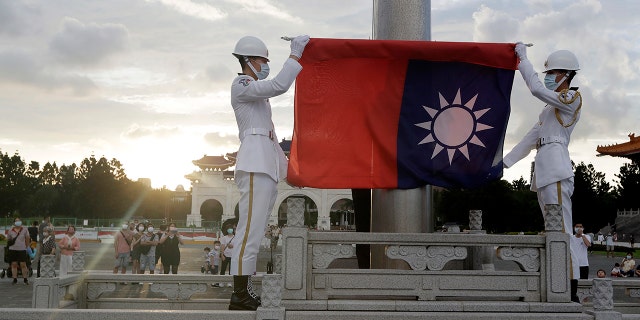
FILE – Two soldiers fold the national flag during the daily flag ceremony in Liberty Square of Chiang Kai-shek Memorial Hall in Taipei, Taiwan, Saturday, July 30, 2022. (AP Photo/Chiang Ying-ying)
The spokesperson also told reporters such alleged cooperation between Taiwan and the U.S. to push for the island’s independence is “doomed to failure.”
China has said it will maintain its control over Taiwan by force if necessary, often using its military and diplomatic efforts to exercise the control. The sides split amid a civil war in 1949.
U.S. FORCES CHINA’S HAND IN REVEALING POSSIBLE LETHAL AID TO RUSSIA AMID WAR IN UKRAINE: EXPERTS
The Pentagon did not comment directly on Chase’s visit but repeated its “commitment to Taiwan is rock-solid and contributes to the maintenance of peace and stability across the Taiwan Strait and within the region,” the Associated Press reported.
Taiwan’s Ministry of Foreign Affairs also did not address the visit.
Chinese Foreign Ministry spokesperson Wang Wenbin similarly accused the U.S. of coordinating a push for independence and said a “new round of tensions” in the Taiwan Strait was the result of such attempts to “seek independence with U.S. support, as well as the U.S. intention to contain China with Taiwan.”
“We urge the U.S. to … stop any form of official U.S.-Taiwan contacts, stop meddling in the Taiwan issue and stop creating new factors of tension in the Taiwan Strait,” Wang said Wednesday.
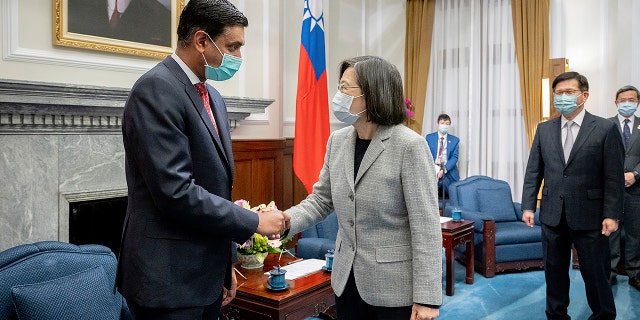
In this photo released by the Taiwan Presidential Office, Taiwan’s President Tsai Ing-wen, center, shakes hands with California Rep. Ro Khanna during a meeting at the Presidential Office in Taipei, Taiwan on Tuesday, Feb. 21, 2023. (Taiwan Presidential Office via AP)
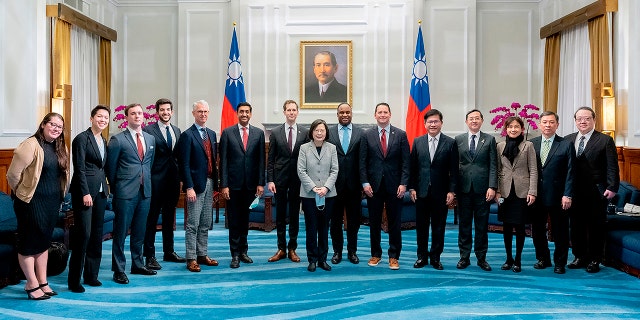
In this photo released by the Taiwan Presidential Office, Taiwan’s President Tsai Ing-wen, center, and Taiwanese officials pose for photos with a U.S. delegation led by California Rep. Ro Khanna, sixth from left, during a meeting at the Presidential Office in Taipei, Taiwan on Tuesday, Feb. 21, 2023. (Taiwan Presidential Office via AP)
Tensions between the U.S. and China remain unsteady as Washington accused Beijing of using a balloon that carried surveillance capabilities that soared over the continental U.S. before it was shot down off the coast of South Carolina.
CHINA THREATENS US WITH ‘CONSEQUENCES’ OVER SPYCRAFT SHOOTDOWN, SAYS IT WILL NOT ‘FLINCH’
Immediately following the spy balloon controversy, Secretary of State Antony Blinken canceled a trip to Beijing and the U.S. continues to criticize communication between China and Russia over the latter’s invasion of Ukraine.
China, in response, said it has “no limits” in its friendship with Russia and instead blames the U.S. and NATO for provoking the Kremlin.
“The U.S. is the biggest source of weaponry for the battlefield in Ukraine,” Wang said during the briefing. “We do not accept the U.S.’s finger-pointing or even coercion targeting China-Russia relations. The U.S. should seriously reflect on what it has done, stop fanning the flames or profiting from it, and stay truly committed to promoting peace talks as China has been doing.”
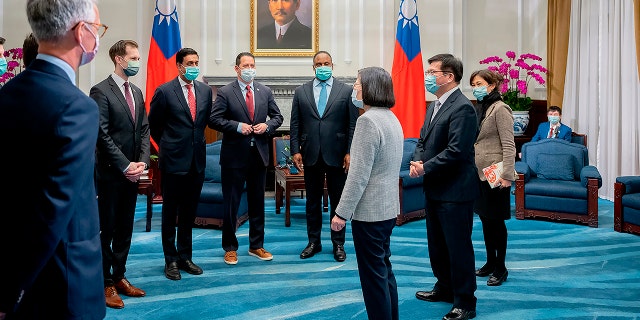
In this photo released by the Taiwan Presidential Office, Taiwan’s President Tsai Ing-wen, center, meet with a U.S. delegation led by California Rep. Ro Khanna, third from left during a meeting at the Presidential Office in Taipei, Taiwan on Tuesday, Feb. 21, 2023. (Taiwan Presidential Office via AP)
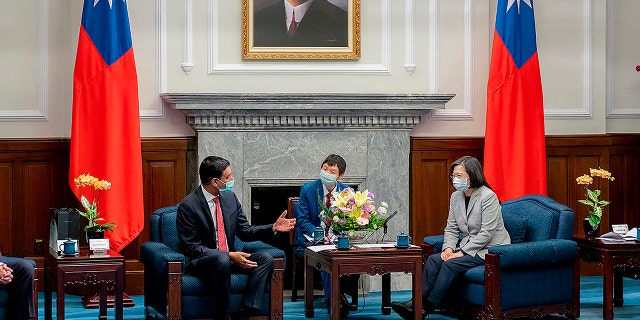
A delegation of U.S. lawmakers led by Khanna on Tuesday met with Taiwan’s president, who promised to deepen military cooperation between the two sides despite objections from China, which claims the island as its own territory. (Taiwan Presidential Office via AP)
A delegation of U.S. lawmakers — including Reps. Ro Khanna, D-Calif., Tony Gonzales, R-Texas, Jake Auchincloss, D-MA, and Jonathan Jackson, D-Illin. — visited Taiwan earlier this week as part of their five-day visit.
CLICK HERE TO GET THE FOX NEWS APP
On Monday, the delegation met with the head of the legislature and the following day they met with President Tsai Ing-wen and other officials.
The congressional team also met with Taiwan Semiconductor Manufacturing Company’s founder Morris Chang, considered the father of the island’s world-leading microchip industry that is now investing heavily in U.S. production.
The Associated Press contributed to this report.

 Latest Breaking News Online News Portal
Latest Breaking News Online News Portal



